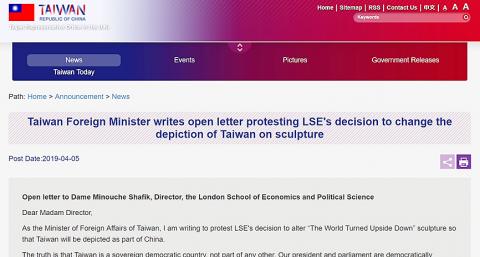A British parliamentary group on Thursday waded into a debate on Taiwan’s status, saying that its designation on a giant globe sculpture on the campus of a London university was not based on fact.
The World Turned Upside Down sculpture at the London School of Economics and Political Science (LSE) was altered to show Taiwan as part of China, which the lawmakers said was not only erroneous, but contrary to government policy in the UK.
“Depicting Taiwan as part of China is inaccurate and misleading, as Taiwan has never been a part of the People’s Republic of China,” lawmakers Nigel Evans and Lord Rogan, cochairs of the British-Taiwanese All-Party Parliamentary Group, wrote in a letter to the university.

Screen grab from the Internet
The university’s decision, driven by pressure from its Chinese students, is also contrary to the British government’s long-standing policy of referring to Taiwan as “Taiwan,” they said, citing a public statement made in July last year by British Minister of State for Asia and the Pacific Mark Field.
“The designation ‘Taiwan’ is used across all government departments and agencies as shown on the gov.uk/worldwide Web site and the [British] Foreign and Commonwealth Office’s territory register,” said the letter, which was addressed to LSE director Nemat Shafik. “Your decision therefore is neither based on fact nor in line with the UK’s policy and practice.”
They urged the university to reconsider its decision and restore the original designation of Taiwan on the sculpture “in order to maintain accuracy, prevent political interference and safeguard our shared values of freedom of speech and expression.”
On Tuesday last week, the university unveiled the new sculpture by Turner Prize-winning artist Mark Wallinger outside its Saw Swee Hock Student Centre.
The sculpture depicts a political globe, 4m in diameter, with nations and borders outlined, but with “the revolutionary twist of being inverted,” the university’s Web site said.
When it was unveiled, the sculpture had Taiwan labeled as “REP. CHINA (Taiwan)” and colored pink, while China was labeled “CHINA (People’s Republic) and colored yellow.
However, after Chinese students at the university lodged a protest over Taiwan’s designation, the school on Wednesday called a meeting between them and their Taiwanese counterparts.
The Chinese students proposed changing the globe’s original design to make Taiwan the same color as China, a suggestion that was accepted by the university.
On Thursday, the Ministry of Foreign Affairs said that it had directed its representative office in the UK to ask the university to reconsider its decision.
Asked about the issue, the British Office Taipei said that the British government’s long-standing policy on Taiwan had not changed.
“We refer to Taiwan as Taiwan. This is ultimately a matter for LSE, an independent institution,” the office said.
President Tsai Ing-wen (蔡英文) is an alumna of the university, which is a popular choice for Taiwanese students seeking further education at a prestigious British school.
Tsai yesterday said that she was seeking clarification about the incident.
“Whether the London School of Economics and Political Science is my alma mater or not, it is an undeniable fact that we are not disappearing from the world,” Tsai said. “We are a sovereign and independent nation.”
Additional reporting by Chan Shih-hung

A Ministry of Foreign Affairs official yesterday said that a delegation that visited China for an APEC meeting did not receive any kind of treatment that downgraded Taiwan’s sovereignty. Department of International Organizations Director-General Jonathan Sun (孫儉元) said that he and a group of ministry officials visited Shenzhen, China, to attend the APEC Informal Senior Officials’ Meeting last month. The trip went “smoothly and safely” for all Taiwanese delegates, as the Chinese side arranged the trip in accordance with long-standing practices, Sun said at the ministry’s weekly briefing. The Taiwanese group did not encounter any political suppression, he said. Sun made the remarks when

PREPAREDNESS: Given the difficulty of importing ammunition during wartime, the Ministry of National Defense said it would prioritize ‘coproduction’ partnerships A newly formed unit of the Marine Corps tasked with land-based security operations has recently replaced its aging, domestically produced rifles with more advanced, US-made M4A1 rifles, a source said yesterday. The unnamed source familiar with the matter said the First Security Battalion of the Marine Corps’ Air Defense and Base Guard Group has replaced its older T65K2 rifles, which have been in service since the late 1980s, with the newly received M4A1s. The source did not say exactly when the upgrade took place or how many M4A1s were issued to the battalion. The confirmation came after Chinese-language media reported

The Taiwanese passport ranked 33rd in a global listing of passports by convenience this month, rising three places from last month’s ranking, but matching its position in January last year. The Henley Passport Index, an international ranking of passports by the number of designations its holder can travel to without a visa, showed that the Taiwan passport enables holders to travel to 139 countries and territories without a visa. Singapore’s passport was ranked the most powerful with visa-free access to 192 destinations out of 227, according to the index published on Tuesday by UK-based migration investment consultancy firm Henley and Partners. Japan’s and

BROAD AGREEMENT: The two are nearing a trade deal to reduce Taiwan’s tariff to 15% and a commitment for TSMC to build five more fabs, a ‘New York Times’ report said Taiwan and the US have reached a broad consensus on a trade deal, the Executive Yuan’s Office of Trade Negotiations said yesterday, after a report said that Washington is set to reduce Taiwan’s tariff rate to 15 percent. The New York Times on Monday reported that the two nations are nearing a trade deal to reduce Taiwan’s tariff rate to 15 percent and commit Taiwan Semiconductor Manufacturing Co (TSMC, 台積電) to building at least five more facilities in the US. “The agreement, which has been under negotiation for months, is being legally scrubbed and could be announced this month,” the paper said,